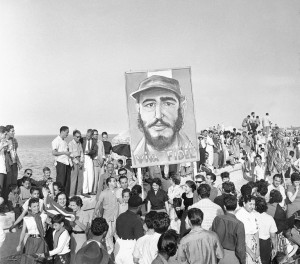What Trump Misses About Cuba
< < Go Back
DONALD J. TRUMP has never felt compelled to play by conventional rules — neither in business nor in politics — and that iconoclasm has made him a billionaire and president-elect of the United States. But if he thinks he can use his business practices abroad as a model for negotiations with foreign governments, he will be in for a rude awakening, especially with Cuba. Mr. Trump’s foreign business deals have been lucrative, but they exemplify just the sort of cronyism and shady dealing that characterized American business practices in Cuba before Fidel Castro’s revolution — practices that stoked Cuban nationalism, increased Mr. Castro’s popularity and led to the seizure of over a billion dollars of American property.
In a scene from “The Godfather II,” Cuba’s dictator, Fulgencio Batista, shows off a solid gold telephone in the presence of American business leaders who gave it to him as thanks for his business-friendly policies.
The American-owned Cuban telephone company actually did that in 1957. In another scene, the leaders of stateside crime families partying in Havana cut up a cake topped with icing that reads “Cuba.” That scene was apocryphal, but organized crime did control the Cuban hospitality industry in the 1950s — the hotels, casinos, bars and clubs — along with the associated vices of drugs, gambling and prostitution. The police looked the other way, and Batista got a piece of the take.
To Mr. Castro and many other Cubans, such behavior was an affront to national dignity and sovereignty. In 1963, a French reporter quoted President John F. Kennedy as having said, in an interview, “Now, we shall have to pay for those sins.”
The bitter memories of those years led Mr. Castro to expel American businesses and close down the tourism industry. Yet this sort of unsavory collusion between business and government has been routine in Mr. Trump’s overseas operations, as The Times has reported. Mr. Trump even sent consultants to Cuba in 1998 to investigate a hotel deal, although that violated American economic sanctions.
Will Mr. Trump carry his style of doing business into the White House?
Mr. Castro’s death prompted Mr. Trump to reiterate a campaign promise he made: Unless Cuba is willing to negotiate better terms with Washington, he will reverse President Obama’s policy of engagement. “If Cuba is unwilling to make a better deal for the Cuban people, the Cuban/American people and the U.S. as a whole, I will terminate deal,” he tweeted on Monday.
The United States-Cuba relationship Mr. Trump will inherit from President Obama is actually not a result of just one deal but a complex fabric of many “deals” — more than a dozen bilateral agreements and a variety of commercial relationships in telecommunications, hospitality, transportation and health care.
What sort of results can Mr. Trump expect in a new deal? For two years, diplomatic negotiations between Washington and Havana have advanced at blazing speed, with a dozen new agreements signed, from environmental protection to law enforcement cooperation against drug traffickers. Cuba is not averse to further talks.
But sovereignty is something else. Raúl Castro, like his brother, has always ruled out negotiating Cuba’s domestic political and economic arrangements. During President Obama’s policy of normalization, Cuba has shown some modest progress on religious freedom, economic liberalization and even freedom of expression. But those were not results of direct negotiations or demands from Washington. They are byproducts of reduced tensions between the United States and Cuba, attributable to engagement itself.
In other words, if President Trump’s negotiators pound the table demanding political concessions from Cuba, it won’t get them far.
Mr. Trump has enough negotiating experience to realize that both sides must agree to a deal. If he really wants one with Cuba, there are actually several deals to be had — on claims compensation, terms for trade and investment, and a plethora of issues of mutual interest.
What he surely won’t get is the kind of sweetheart deals he’s gotten elsewhere for the Trump Organization, much as he might still dream of opening a Trump Tower Havana. Cubans have no interest in returning to that sort of crony capitalism. But as president, he could close deals that would serve the interests of both the American and Cuban people. A return to hostility, name-calling and bluster as a policy would serve the interests of neither and would be a huge, conspicuous failure of the art of the deal.
More From The New York Times:




